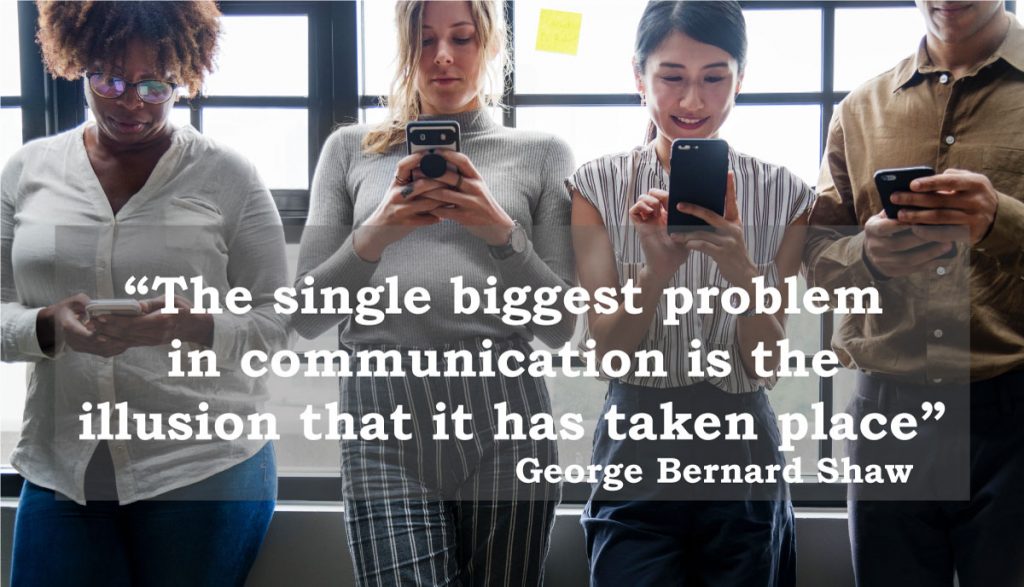In this blog we explore what highly effective communication is and why it is important to your organisation. We also ask the question why, despite the importance of good communication, it is still practised so poorly!

So why is communication so important?
Highly effective communication:
- Builds and maintain relationships
- Engages, energises and motivates people – they are inspired to share in our vision (a shared goal) and therefore willing to get on the bus and stay on the bus (join us on our journey to achieve the shared goal).
- Ensures that the right things are done at the right time and in the right way
- Allows us to resolve conflict and disputes constructively – in fact in turns conflict into an opportunity rather than a threat.
Where is highly effective communication relevant in our organisation?
Quite literally everywhere! When I mention the importance above it is easy to assume this simply applies to managing our team of people.
In reality it applies to every person and every organisation our own organisation comes into contact with. Yes, employees, but also customers, suppliers, regulators, trade bodies, our communities and even the government! We may call this group stakeholders – everyone that is influenced by, or can influence the success of, what we do.
Think about it, what is the benefit of communicating well with customers but not our employees? How can our employees meet the needs of customers or manage relationships with key suppliers if we communicate badly with them (i.e. they don’t know what they should be doing or how)?
What is highly effective communication?
Well I’m glad you asked! Communication goes on around us constantly but it is important to realise it isn’t always effective. In fact, very often it is the exact opposite – sending people off in completely the wrong direction, destroying relationships, creating misunderstanding and at worst fuelling conflict and hostility.
So highly effective communication isn’t just any old communication. It is communication that includes a number of key ingredients:
- It is two-way
- It is understood by all – clear, concise and unambiguous
- Involves listening (we mean properly listening and not just going in one ear and out the other!)
- Incorporates some form of feedback
- Achieves its purpose or aims for all those involved (e.g. solves a problem, passes crucial information, inspires and motivates)

Effective communication is critically important but poorly practised!
When we are delivering our training and coaching, we constantly stress the importance of communication and what makes it effective. Many times it has been said to us “well, that is obvious”. But, if that is the case, why is effective communication so difficult to put into practice?
The reasons are numerous of course. Some are obvious but others involve us undertaking self-reflection which for many is an uncomfortable experience. We don’t really like to admit that we could improve the way we do things!
Typical obstacles include:
- We are in too much of a hurry. Believing we are short of time we cut corners or prioritise other activities first – listening is often the first thing to go closely followed by giving feedback. We rely on telepathy which in our experience is hard to master!
- We lack sufficient empathy for others. Focusing on our own needs at the expense of those of others. If we are being totally honest we can all probably accept that we do this from time to time!
- Communication is a scripted part of a process. Increasingly we are being told what to say and when (think of call centres) to win a sale, keep someone happy or to reduce risk. Lacking in sincerity and authenticity those listening tend to turn off rather than engage.
- We fail to recognise that what makes sense to us doesn’t always make sense to others. People take in and absorb information in different ways and our approach for conveying information, if we simply choose one way, may not work for everyone. We see this very often where technical language and jargon are being used. Or we are talking with people whose first language is different from our own.
- We find communication stressful and fear provoking – dealing with complaints, carrying out appraisals, performance managing people – we get anxious at the prospect of saying things to people they may not like and therefore avoid it!
- We are relying on technology that makes things quick but doesn’t necessarily mean communication is effective. I’m not against technology of course only making sure the right technology is used for the right job – a text message will never be a good way to sack someone!
How do I know if there is a problem with communication?
The symptoms of communication being less than effective includes:
- Things don’t get done or get done wrong. Even when we have told people what we expect more than once!
- Relationships are not positive or productive.
- There is a reluctance to support our plans and initiatives (e.g. resistance to change)
- We get lots of complaints – from those we employ, customers and suppliers.
- For us personally, everything seems to be hard work or a challenge. A constant battle to make things happen that leaves us exhausted and stressed out.
The list isn’t definitive of course but hopefully you get the idea!
So what can I do about it if I am worried?
The starting point has to be at least to ask yourself the questions – am I communicating effectively? Are our processes adequately supporting effective communication? However, we are not always be the best person to judge this so involving others is vitally important. Certainly all those who would be beneficiaries of effective communication being practiced.
If areas of improvement are highlighted then fix them.
- Improve processes
- Invest in training – e.g. customer service, leadership and management, managing conflict, sales training, all of which are built on a foundation of good communication.
- Ensure that effective communication becomes part of your people management processes – set and monitor performance standards, ensure great communication is a criteria of your recruitment process.
- Create the opportunity for others to share feedback and comments which are then taken into consideration – e.g. morning team briefings, questionnaire’s and surveys. Develop behaviours that support sharing such as empathy, patience and tolerance.
Next steps?
If you would like to find out more about how you can transform communication in your organisation call us on 07961 674535 or email [email protected].
